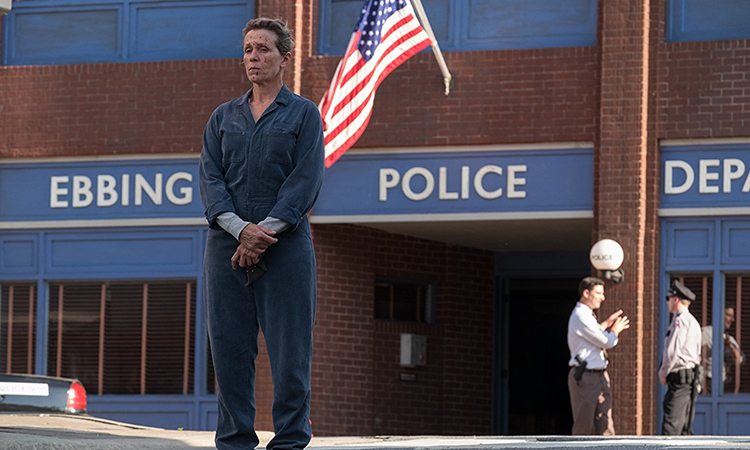Mildred Hayes lives in the small town of Ebbing, Missouri. Her daughter did too, until she was raped and set on fire while walking alone one night. The police failed to properly address the murder and never made any arrests, which didn’t sit well with Mildred Hayes. She rents and paints three billboards outside the town in order to spread awareness of her plight to anyone driving by. While she’s buying the billboards at an advertising agency, she notices a problem with a simpler solution: a bug on the windowsill, struggling to get upright. Her rough exterior cracks briefly as she flips the insect over and restores balance.
This microcosm is the film’s closest approach to rectitude without consequence, and writer/director Martin McDonagh sets that standard knowingly. “Three Billboards Outside Ebbing, Missouri” is a film of big problems and little details, an emotionally brutal descent into our complex world of no true justice. McDonagh’s refusal to provide easy answers blackens his work marvelously: his other two movies, “In Bruges” and “Seven Psychopaths”, are dark comedies that bathe humanity’s violence in moral ambiguity. “Three Billboards” is his darkest, funniest, and most ambiguous effort yet—and thus his most human.
McDonagh utilizes the invisible style of filmmaking to underline such intricacies. His directorial style never calls attention to itself, preferring to frame the depths of depravity like a silent observer. This understated visual grace flows into the film’s undercurrent of reserving no judgment for the wicked.
Methodical editing, well-timed cuts, and a brooding score give McDonagh’s masterwork of a screenplay room to breathe. The story of “Three Billboards” conveys the quiet brutality of human struggle, paced immaculately to let each pain resonate with a rawness that ruins your composure. McDonagh need not preach to convey his message.
What he communicates is heartbreaking and life giving, a synthesis that is at once impossible and inevitable, given the film’s deep well of empathy for its messed-up characters. McDonagh accomplishes such a feat by means of his renowned genre balance: on one hand, “Three Billboards” is an oppressive drama, exploring how the pursuit of justice will always beget injustice in a broken world. On the other, it’s a comedy, laughing fatalistically at the contradictory nature of it all. The combination of both hands forms a gesture that beckons us to identify with the film’s characters, as if that’s the only way out of the mire.
This salvation of understanding is the gospel in the actors’ hearts. The performances that articulate McDonagh’s judicial paradox are extraordinary. Frances McDormand should be an easy choice for Best Actress: her grim determination could only belong to a mother that lost her child; her heartrending fragility could only belong to a mother that lost her child. Woody Harrelson manages to humanize the law and recognize the problem with its enforcement in his role as town sheriff.
Amidst the merry-go-round of supporting roles—including flawless turns from the likes of Peter Dinklage and Caleb Landry Jones—Sam Rockwell is the mightiest standout. Rockwell has long gone unnoticed as one of the greatest talents of our time, and hopefully he garners more recognition as Officer Dixon. Rockwell both flaunts and fights the character’s flaws, a practice with which we all share an uncomfortable familiarity.
McDonagh’s dialogue cuts ties and strains relationships, but like life, the film lurches on towards no sensible conclusion. The ache and agony of “Three Billboards” either necessitates divine intervention or strands humanity in the harshness of godless reality. We can’t be sure which, and as McDonagh reveals, that’s kind of funny—if you can see that through watery eyes. As far as I’m concerned, “Three Billboards” is McDonagh’s third perfect film in a row.
★★★★★ (5 out of 5)




